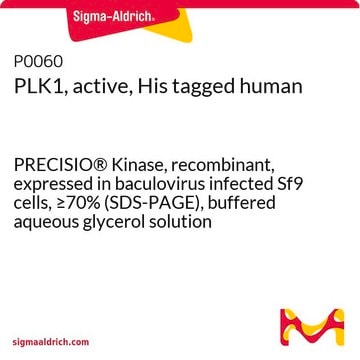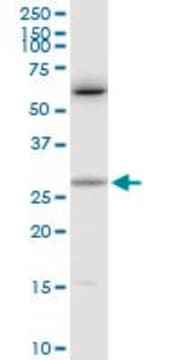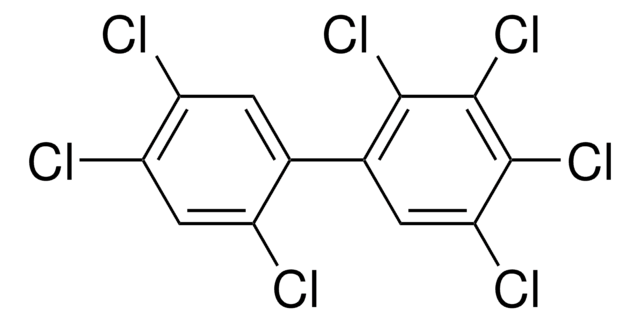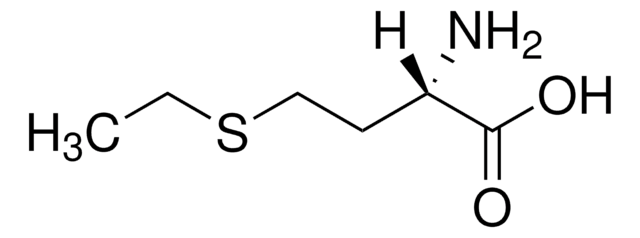SRP0360
PLK1 Polo Box Domain active human
recombinant, expressed in E. coli, ≥90% (SDS-PAGE)
Sinónimos:
STPK13, polo-like kinase 1
Iniciar sesiónpara Ver la Fijación de precios por contrato y de la organización
About This Item
UNSPSC Code:
12352200
NACRES:
NA.32
Productos recomendados
biological source
human
recombinant
expressed in E. coli
assay
≥90% (SDS-PAGE)
form
aqueous solution
mol wt
53 kDa
packaging
pkg of 100 μg
storage condition
avoid repeated freeze/thaw cycles
concentration
2.9 mg/mL
NCBI accession no.
UniProt accession no.
shipped in
dry ice
storage temp.
−70°C
Gene Information
human ... PLK1(5347)
General description
Human Plk1 polo box domain (GenBank Accession No. NM_005030), amino acids 367-end with N-terminal GST-tag, MW=53 kDa, expressed in an E. coli expression system.
Polo-like kinase 1 (PLK1) belongs to the PLK family. It comprises polo-box domain (PBD). PBD, in turn, contains polo boxes (PB1 and PB2) with a 6-stranded β sandwich and an α helix as structural elements. The PLK1 gene is mapped to human chromosome 16p12.2.
Application
PLK1 Polo Box Domain active human has been used in the in vitro binding assay with various synthetic peptides coupled to streptavidin beads. It has also been used in binding studies with fluorescein-labeled substrate peptide 5-carboxyfluorescein-GPMQSpTPLNG to test the effect of various inhibitors.
Biochem/physiol Actions
Polo-like kinase 1 (PLK1) is a mitotic kinase that mediates the regulation of various events in mitosis including chromosome segregation, cytokinesis, centrosome maturation, and separation. It activates cell division cycle 25 (CDC25) phosphatase which further regulates mitotic entry. Elevated expression of PLK1 is observed in many tumors.
Storage Class
10 - Combustible liquids
wgk_germany
WGK 2
flash_point_f
Not applicable
flash_point_c
Not applicable
Certificados de análisis (COA)
Busque Certificados de análisis (COA) introduciendo el número de lote del producto. Los números de lote se encuentran en la etiqueta del producto después de las palabras «Lot» o «Batch»
¿Ya tiene este producto?
Encuentre la documentación para los productos que ha comprado recientemente en la Biblioteca de documentos.
Sara Abdelfatah et al.
Journal of advanced research, 16, 145-156 (2019-03-23)
Polo-like kinase 1 (PLK1), a member of the Polo-like kinase family, plays an important regulatory role in mitosis and cell cycle progression. PLK1 overexpression is correlated with tumourigenesis and poor prognosis in cancer patients. Therefore, the identification of novel compounds
Zsofia A Novak et al.
Developmental cell, 37(6), 545-557 (2016-06-22)
Centrosomes and cilia are organized by a centriole pair comprising an older mother and a younger daughter. Centriole numbers are tightly regulated, and daughter centrioles (which assemble in S phase) cannot themselves duplicate or organize centrosomes until they have passed
S-L Zhou et al.
European review for medical and pharmacological sciences, 23(5), 2084-2091 (2019-03-28)
Our study aimed to explore the effects of miRNA-296-5p on the biological behaviors of papillary thyroid carcinoma (PTC) cells and its potential mechanism. Twenty-eight PTC tissues and the corresponding non-cancerous tissues were collected. Real Time-quantitative Polymerase Chain Reaction (RT-qPCR) analysis
Sugunadevi Sakkiah et al.
PloS one, 9(7), e101405-e101405 (2014-07-19)
The polo-like kinase 1 (Plk1) is a critical regulator of cell division that is overexpressed in many types of tumors. Thus, a strategy in the treatment of cancer has been to target the kinase activity (ATPase domain) or substrate-binding domain
Begoña García-Alvarez et al.
Acta crystallographica. Section F, Structural biology and crystallization communications, 62(Pt 4), 372-375 (2006-04-04)
Polo-like kinase (Plk1) is crucial for cell-cycle progression via mitosis. Members of the Polo-like kinase family are characterized by the presence of a C-terminal domain termed the Polo-box domain (PBD) in addition to the N-terminal kinase domain. The PBD of
Nuestro equipo de científicos tiene experiencia en todas las áreas de investigación: Ciencias de la vida, Ciencia de los materiales, Síntesis química, Cromatografía, Analítica y muchas otras.
Póngase en contacto con el Servicio técnico








